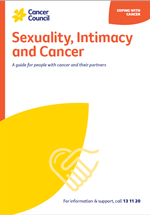- Home
- About Cancer
- Managing side effects
- Sexuality, intimacy and cancer
- Overcoming specific challenges
- Loss of desire
Loss of desire
While loss of desire may not be a problem for some people, changes in sex drive or interest (low libido) are common during cancer treatment.
There are many reasons why your libido might change, including:
- treatment side effects such as feeling tired and sick
- pain when recovering from surgery
- being too worried about the cancer to think about sex
- fear of pain during penetrative sex
- changes in your hormone levels
- loss of confidence and self-esteem as treatment may have changed the way you look.
Most people find that their libido returns when treatment ends, but keep in mind that hormone levels also change with age, and you may notice a gradual decrease in your sex drive as you get older.
Adjusting to changes in sex drive can be emotionally and physically challenging for people with cancer. Discuss the changes with your partner, so they can understand instead of feeling rejected.
If you feel you need further support or ideas on how to help your relationship get through this stressful time, consider talking to a counsellor, sexual health physician or sex therapist. Speak to your doctor for contacts in your local area or call Cancer Council 13 11 20.
Tips for when your libido is low
- Make it a priority to spend time with your partner. Arrange a “date” or even a weekend away.
- Enjoy physical contact without sexual penetration to maintain intimacy. Try skin-to-skin touch, such as massaging each other, or having a bath together.
- Suggest a quick, gentle lovemaking session rather than a long session.
- Keep an open mind. You could read an erotic story, watch an erotic movie or try some adult products (e.g. personal lubricants and sex toys like vibrators). These may help spark your interest in sex or your partner can masturbate, either alone or with you present.
- Stimulate yourself so you become aware of how you like to be touched.
- Change the venue. If you and your partner have been coping with the side effects of treatment at home, book a night away or try using rooms in the house that are not associated with cancer.
- If your usual sexual positions have become uncomfortable, experiment with different ones to find something that feels better.
- Use cushions or pillows to support your weight.
- Rearrange the bedroom furniture or think about redecorating once your treatment is over.
- Ask your doctor about having a hormonal assessment to check your hormone levels.
- Try different ways of getting in the mood for intimacy: wear clothes that make you feel sensual, light candles and play soothing music, shower or bathe together, share erotic images or stories, or have a weekend away if you can – whatever makes you feel sexy, relaxed and good about each other.
My wife went off sex completely during her treatment, which was difficult for me. When we talked about it, and she told me she still loved me, it made me feel better.
David
→ READ MORE: Erection problems
Podcast: Sex and Cancer
Listen to more of our podcast for people affected by cancer
More resources
Dr Margaret McGrath, Head of Discipline: Occupational Therapy, Sydney School of Health Sciences, The University of Sydney, NSW; Yvette Adams, Consumer; Dr Kimberley Allison, Out with Cancer study, Western Sydney University, NSW; Andreea Ardeleanu, Mental Health Accredited Social Worker, Cancer Counselling Service, Canberra Health Service, ACT; Kate Barber, 13 11 20 Consultant, Cancer Council Victoria; Dr Kerrie Clover, Senior Clinical Psychologist, Psycho-Oncology Service, Calvary Mater Newcastle, NSW; Maree Grier, Senior Clinical Psychologist, Royal Brisbane and Women’s Hospital, QLD; Mark Jenkin, Consumer; Bronwyn Jennings, Gynaecology Oncology Clinical Nurse Consultant, Mater Health, QLD; Dr Rosalie Power, Out with Cancer study, Western Sydney University, NSW; Dr Margaret Redelman OAM, Medical Practitioner and Clinical Psychosexual Therapist, Sydney, NSW; Kerry Santoro, Prostate Cancer Specialist Nurse Consultant, Southern Adelaide Local Health Network, SA; Simone Sheridan, Sexual Health Nurse Consultant, Sexual Health Services – Austin Health, Royal Talbot Rehabilitation Centre, VIC; Prof Jane Ussher, Chair, Women’s Heath Psychology and Chief Investigator, Out with Cancer study, Western Sydney University, NSW; Paula Watt, Clinical Psychologist, WOMEN Centre, WA.
View the Cancer Council NSW editorial policy.
View all publications or call 13 11 20 for free printed copies.
Need to talk?
Support services
Coping with cancer?
Speak to a health professional or to someone who has been there, or find a support group or forum
Life after cancer treatment
Webinars, exercise and nutrition, sexuality programs, and back-to-work support
Cancer information
Your coping toolbox
Strategies for managing difficult situations during and after cancer treatment
View our publications
Guides and fact sheets for people with cancer, their families and friends

